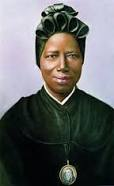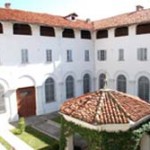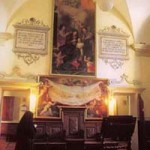You may be familiar with St. Josephine Bakhita,( 1869 – 8 February 1947) a  Sudanese-born former slave who became a Roman Catholic Canossian nun in Italy, living and working there for 45 years. In 2000, she was declared a saint by the Roman Catholic Church
Sudanese-born former slave who became a Roman Catholic Canossian nun in Italy, living and working there for 45 years. In 2000, she was declared a saint by the Roman Catholic Church
But there was another Josephine, her predecessor, (1847-1855), with a similar story!
Kidnapped from her parental home in Africa,7 year old Ahmna-Josephine was rescued by Fr Nicolas Olivieri, an Italian Priest, in 1853, and placed in the Visitation Monastery in Pinerolo, Italy, to be cared for by the Visitation Nuns.
At 9, she was professed as Sister Laurensine Fremiot, on her deathbed, in great sanctity.
This is her story.
“One day in the infirmary, when the little girl was in a pensive mood, the Sister Infirmarian, in an effort to divert her, said, ” Tell me, Ahmna, of your life before you came to us.” With touching simplicity the child obediently complied.
“My mamma was beautiful and had a great many women to wait upon her. My father was always well dressed,. I was their only child, and was allowed to play in the courtyard, carefully guarded by the women for fear a Gelaba, or child-stealer, would come in. But one day I was left alone at my play, and hearing steps behind me I looked up to see the dreaded Gelaba. I screamed and started to run, but the man seized my hand, then caught me up. When we were far from the house he put me down, took hold of my hand, and commanded me to run; but, alas! I could not keep up with his long steps, and my feet were soon bleeding and full of thorns. Seeing that I really could not walk, the ugly Gelaba carried me to his house, where his wife, with a large thorn, drew out all the thorns from my feet and gave me a little bread to eat. I ate it, but I was thinking all the while of my dear father and mother and of the home I should see no more.
“Then he told me one day that he was going to sell me, and, soon after, my dear, noble Father Olivieri came with money to buy me. He took me in his arms so tenderly and carried me to the ship; and peace came back to my heart, and I was very happy even though I feared the sea.
“The blows I had received, and being so long without food, made me fall ill. The good Father wept, he was so afraid I would die. When we left the ship he carried me to a house of religious who took care of me for two days; then he brought me to the ship where we met Nina, his servant, “And then—ah! then, dear Sister, we came here, and I shall not forget what Father Olivieri said to me: ‘I am going to give you to the Sisters, who love little children very much and give them all sorts of good things. They will teach you of Jesus, and therefore you will be very happy. And you must always be good, and love and obey them, for it is the will of God that you live with them always.’ Then he gave me his blessing. And now, though I am always ill, how true it is that I am well taken care of and have everything I want. And when I die I shall go to heaven.”
Such was the little sufferer’s own account of the tragedies of her slavery, and of the bitter lessons she had had to learn at an age when other little children know only love and tenderest care. . She studied her catechism most carefully and reverently, and, inspied by the Holy Spirit, never failed to understand the instructions on the mysteries and maxims of Faith.
Baptism
 A longing to be baptized influenced her from the first. Whenever she met the Bishop she would present her little head to him, saying, ” Wilt thou not baptize me, dear Bishop?. Ah, make me a child of God!” She received the crucifix for the first time in a transport of love, caressing it and weeping over it. The little she had learned of the sufferings of Jesus for all men had filled her with deepest adoration.
A longing to be baptized influenced her from the first. Whenever she met the Bishop she would present her little head to him, saying, ” Wilt thou not baptize me, dear Bishop?. Ah, make me a child of God!” She received the crucifix for the first time in a transport of love, caressing it and weeping over it. The little she had learned of the sufferings of Jesus for all men had filled her with deepest adoration.
Even before her baptism Ahmna’s desire for Holy Communion was so great that, after becoming a Christian and being made a soldier of Christ in Confirmation, her longing to unite herself to the God of love knew no bounds. “Dear Bishop,” she would plead, “if thou art really my father, if thou lovest me, give me my Jesus, for I cannot live without Him.” And, sighing, she would observe to the Sisters, “How happy you all are. You have Jesus in your souls
Love of order and modesty were the most prominent traits of her character. As the child’s desire for Baptism daily increased and she was found sufficiently well instructed, the Bishop consented to baptize her on the first Sunday after Easter, 1854. She then received the name of Josephine. Her piety and recollection throughout the ceremony, which lasted two hours, was most edifying and bespoke heroic self-restraint. She was not once seen to raise her eyes. When the Bishop had poured upon her head the regenerating waters, and the dress which marked her former slavery had been replaced by the white baptismal robe, his Lordship placed about her neck a beautifully carved silver crucifix as a pledge of the union between her pure soul and her Redeemer. Josephine’s cup of joy was full. The grace of Baptism gave new strength to her weak little body, and enkindled within her a sanctity which grew with each succeeding day.
First Holy Communion
It became impossible to resist such entreaties, and on the feast of the Sacred Heart, the 23rd of June, 1854, she was permitted to make her first Holy Communion. The child was in an ecstasy of happiness, and her heart overflowed with thankfulness and love.
An insatiable hunger for the Eucharistic food was awakened by her first approach to the Holy Table. When her health permitted her to go to Communion in the chapel, she would ask the evening before to be waked very early, and frequently after a bad night she would have to summon all her strength to go to receive our dear Lord, Who never failed to reward her sacrifice by filling her soul with pure delight. Meanwhile the dear child’s pains became more and more severe. She could not eat, sleep, nor occupy herself with the lightest work, and enforced idleness made her very sad. A terrible cough was added to her other ills. Remedies were administered, but to no avail. She received the Viaticum several times, and at length the Doctor, seeing her danger, advised her receiving Extreme Unction.
On the feast of the holy Mother de Chantal, she said to the Reverend Mother, “This morning after Communion Jesus said to my heart,’ I wish thee to be my spouse.’ And the holy Mother de Chantal said to me,’ I wish thee to be my daughter.’ These words are always in my thoughts, and I think always of Jesus.”
She had preserved these supernatural words in her heart with jealous care, and it was manifest to all that she had received the great grace of a vocation to the religious life. The happiness of a soul entirely consecrated to God delighted her and filled her with a holy desire. She talked of it unceasingly and never saw the Bishop without importuning him most earnestly.
Once when she was most pressing in her entreaties, the good prelate said to her, “Be patient a little longer; you are too young.” “That is true,” replied Josephine, with spirit, ” but it is also true that I will die soon. I have prayed for thee so often at Communion. Has not Jesus whispered to thy heart to give me the veil? Mother, the Sisters, all are willing to have me take the veil. Thou wilt see that Jesus will grant me the favor.”
One day in April, unable to restrain herself longer, Ahmna-Josephine said to the Infirmarian, in a tone that went to the heart and showed the intensity of her desire, “Is it possible they will not give me the veil? Must I die without it?” And not having the courage to refuse the pious child on the very threshold of eternity, the Mother immediately took measures to gratify her desires. The Bishop willingly granted the permission, and, knowing the perfect dispositions of the little invalid, permitted her to take the three simple vows of the religious life.
Profession as a Nun
 On the day appointed for her reception, while the necessary preparations were being made, and while the garlands of flowers were being arranged round her bed, Josephine was occupied only with God. In a short time all was in readiness. They were obliged to hasten for fear of being too late. The dear little nine-year old girl pronounced the solemn words, and received with the veil the name of Sister Laurensine Fremiot, and was given the cross and crucifix.
On the day appointed for her reception, while the necessary preparations were being made, and while the garlands of flowers were being arranged round her bed, Josephine was occupied only with God. In a short time all was in readiness. They were obliged to hasten for fear of being too late. The dear little nine-year old girl pronounced the solemn words, and received with the veil the name of Sister Laurensine Fremiot, and was given the cross and crucifix.
Through all the ceremony the child’s face glowed with a heavenly light. Afterwards she talked constantly of the grace she had received. She showed the cross which was given her, and exclaimed with rapture, “I have at last my cross. I kiss it all the time. How happy I am to be the spouse of Jesus Christ! Our Lord told me that He sent me great suffering in order that I might be very near and dear to His Sacred Heart. . Nothing in the world now pleases me; even my blue dress weighed upon me. I am a spouse of Jesus Christ!”
The dear little sufferer ceased not to thank the Sisters, whom she begged not to leave her. From time to time she would glance with astonishment to the right of her bed, seeming to see something extraordinary. Finally she said to the priest, ” I see Jesus, I see Mary, I see St. Joseph. Oh, how beautiful they are! Soon they will come to take me. My heart tells me that I shall die to-day.”
At half-past twelve she opened her eyes glanced to the right, a lovely smile illumined her face, and her soul took its flight to heaven. Her body, until now so deformed, regained its natural beauty and on her face lingered an expression of heavenly peace as if the last kiss of her Divine Spouse had left thereon the imprint of eternal beatitude.”
 Although she has not yet been canonized, the Sisters of the Visitation Monastery in Pinerolo still preserve her memory.
Although she has not yet been canonized, the Sisters of the Visitation Monastery in Pinerolo still preserve her memory.
You can judge for yourself the holiness of the little girl who became a Visitation nun at 9.
Sources and for Further Reading:
Eucharistic lilies: Youthful Lovers of Jesus in the Blessed Sacrament
By Mary Theodosia Mug, Mary Theodosia Mug (sister)
A LITTLE SAINT of NINE YEARS
A BIOGRAPHICAL NOTICE.
Translated from the French of Mgr. de Segur
MISS MARY McMAHON.■MAY 26 1881
NEW YORK, CINCINNATI, AND ST. LOUIS:
BENZIGER BROTHERS
http://www.archive.org/stream/littlesaintofnin00sgur#page/6/mode/2up
